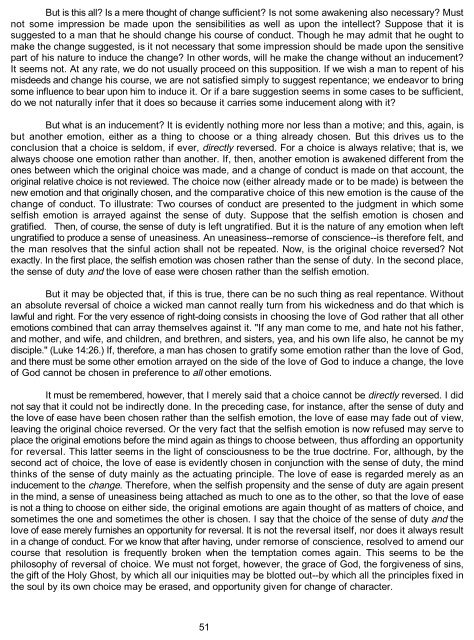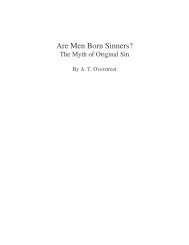Foreknowledge by Joel Hayes - Library of Theology
Foreknowledge by Joel Hayes - Library of Theology
Foreknowledge by Joel Hayes - Library of Theology
Create successful ePaper yourself
Turn your PDF publications into a flip-book with our unique Google optimized e-Paper software.
But is this all? Is a mere thought <strong>of</strong> change sufficient? Is not some awakening also necessary? Must<br />
not some impression be made upon the sensibilities as well as upon the intellect? Suppose that it is<br />
suggested to a man that he should change his course <strong>of</strong> conduct. Though he may admit that he ought to<br />
make the change suggested, is it not necessary that some impression should be made upon the sensitive<br />
part <strong>of</strong> his nature to induce the change? In other words, will he make the change without an inducement?<br />
It seems not. At any rate, we do not usually proceed on this supposition. If we wish a man to repent <strong>of</strong> his<br />
misdeeds and change his course, we are not satisfied simply to suggest repentance; we endeavor to bring<br />
some influence to bear upon him to induce it. Or if a bare suggestion seems in some cases to be sufficient,<br />
do we not naturally infer that it does so because it carries some inducement along with it?<br />
But what is an inducement? It is evidently nothing more nor less than a motive; and this, again, is<br />
but another emotion, either as a thing to choose or a thing already chosen. But this drives us to the<br />
conclusion that a choice is seldom, if ever, directly reversed. For a choice is always relative; that is, we<br />
always choose one emotion rather than another. If, then, another emotion is awakened different from the<br />
ones between which the original choice was made, and a change <strong>of</strong> conduct is made on that account, the<br />
original relative choice is not reviewed. The choice now (either already made or to be made) is between the<br />
new emotion and that originally chosen, and the comparative choice <strong>of</strong> this new emotion is the cause <strong>of</strong> the<br />
change <strong>of</strong> conduct. To illustrate: Two courses <strong>of</strong> conduct are presented to the judgment in which some<br />
selfish emotion is arrayed against the sense <strong>of</strong> duty. Suppose that the selfish emotion is chosen and<br />
gratified. Then, <strong>of</strong> course, the sense <strong>of</strong> duty is left ungratified. But it is the nature <strong>of</strong> any emotion when left<br />
ungratified to produce a sense <strong>of</strong> uneasiness. An uneasiness--remorse <strong>of</strong> conscience--is therefore felt, and<br />
the man resolves that the sinful action shall not be repeated. Now, is the original choice reversed? Not<br />
exactly. In the first place, the selfish emotion was chosen rather than the sense <strong>of</strong> duty. In the second place,<br />
the sense <strong>of</strong> duty and the love <strong>of</strong> ease were chosen rather than the selfish emotion.<br />
But it may be objected that, if this is true, there can be no such thing as real repentance. Without<br />
an absolute reversal <strong>of</strong> choice a wicked man cannot really turn from his wickedness and do that which is<br />
lawful and right. For the very essence <strong>of</strong> right-doing consists in choosing the love <strong>of</strong> God rather that all other<br />
emotions combined that can array themselves against it. "If any man come to me, and hate not his father,<br />
and mother, and wife, and children, and brethren, and sisters, yea, and his own life also, he cannot be my<br />
disciple." (Luke 14:26.) If, therefore, a man has chosen to gratify some emotion rather than the love <strong>of</strong> God,<br />
and there must be some other emotion arrayed on the side <strong>of</strong> the love <strong>of</strong> God to induce a change, the love<br />
<strong>of</strong> God cannot be chosen in preference to all other emotions.<br />
It must be remembered, however, that I merely said that a choice cannot be directly reversed. I did<br />
not say that it could not be indirectly done. In the preceding case, for instance, after the sense <strong>of</strong> duty and<br />
the love <strong>of</strong> ease have been chosen rather than the selfish emotion, the love <strong>of</strong> ease may fade out <strong>of</strong> view,<br />
leaving the original choice reversed. Or the very fact that the selfish emotion is now refused may serve to<br />
place the original emotions before the mind again as things to choose between, thus affording an opportunity<br />
for reversal. This latter seems in the light <strong>of</strong> consciousness to be the true doctrine. For, although, <strong>by</strong> the<br />
second act <strong>of</strong> choice, the love <strong>of</strong> ease is evidently chosen in conjunction with the sense <strong>of</strong> duty, the mind<br />
thinks <strong>of</strong> the sense <strong>of</strong> duty mainly as the actuating principle. The love <strong>of</strong> ease is regarded merely as an<br />
inducement to the change. Therefore, when the selfish propensity and the sense <strong>of</strong> duty are again present<br />
in the mind, a sense <strong>of</strong> uneasiness being attached as much to one as to the other, so that the love <strong>of</strong> ease<br />
is not a thing to choose on either side, the original emotions are again thought <strong>of</strong> as matters <strong>of</strong> choice, and<br />
sometimes the one and sometimes the other is chosen. I say that the choice <strong>of</strong> the sense <strong>of</strong> duty and the<br />
love <strong>of</strong> ease merely furnishes an opportunity for reversal. It is not the reversal itself, nor does it always result<br />
in a change <strong>of</strong> conduct. For we know that after having, under remorse <strong>of</strong> conscience, resolved to amend our<br />
course that resolution is frequently broken when the temptation comes again. This seems to be the<br />
philosophy <strong>of</strong> reversal <strong>of</strong> choice. We must not forget, however, the grace <strong>of</strong> God, the forgiveness <strong>of</strong> sins,<br />
the gift <strong>of</strong> the Holy Ghost, <strong>by</strong> which all our iniquities may be blotted out--<strong>by</strong> which all the principles fixed in<br />
the soul <strong>by</strong> its own choice may be erased, and opportunity given for change <strong>of</strong> character.<br />
51






